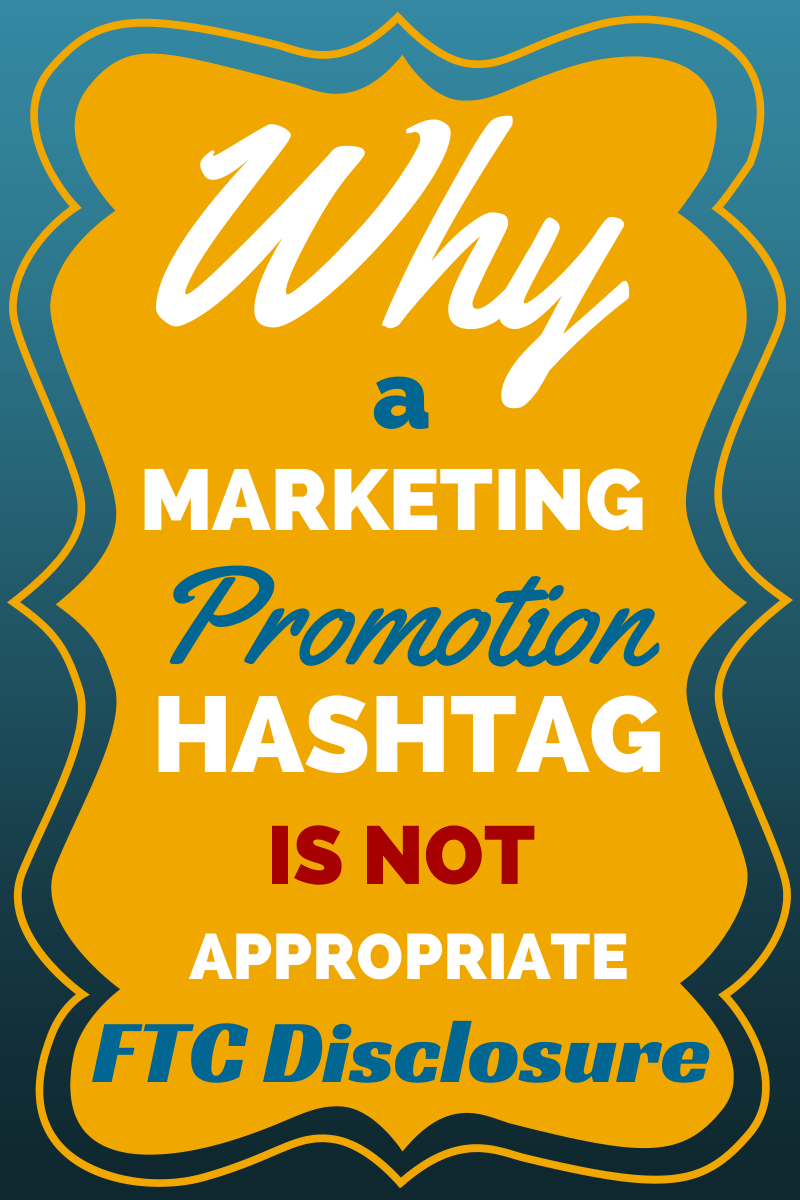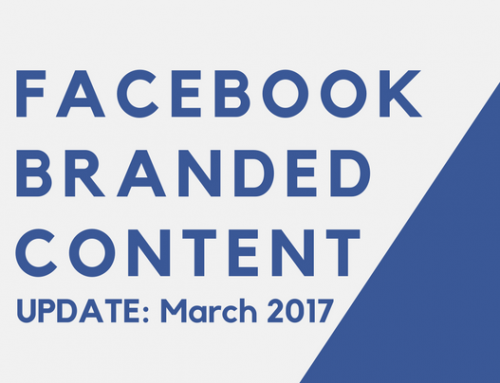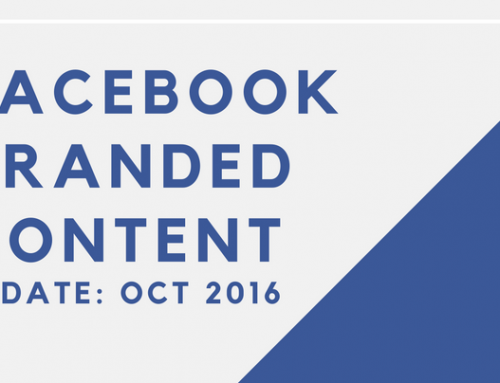FTC Disclosure
Regardless of the social network, hashtags (the # symbol for those who may not be sure what I’m talking about) are an important way to communicate additional information. Originally created so users can search topics, hashtags are now integral to marketing promotions on social networks. That means PR and brand professionals are thinking about what short phrase will best communicate their program long before the program is executed. FTC disclosure
When a brand or agency works with influencers for these promotions, often the influencer is required to add the specific hashtag to each of their social shares (for example, #cutseybrandpromo, #FreshSqueezedJuice, #LuxuryCity, #BrandMoms, #AwesomeHotelStay, or #MovieTagline). That’s an important part of tracking and obtaining metrics. From the brand’s perspective, that tracking information is key. Being able to follow conversations, know what participants are saying, and also be part of the conversations are all significant parts of determining a program’s success.
We find these branded hashtags not only with paid branded programs but also as part of community chats on Twitter, Facebook, and Google+. Even the more visual platforms of Pinterest, Instagram, YouTube and Vine incorporate hashtags and are included in a brand’s social promotion. And while a brand can use the hashtag on its own social channels without much need to provide additional disclosure, the FTC Disclosure Rules are met head-on when brands hire and engage influencers to be part of their promotion.
If you are a social media professional or someone who considers themselves social media proficient, you probably see these hashtags and think it’s a paid brand campaign or the blogger, influencer, or celebrity is likely being paid or compensated in some way for using including hashtag. And you’d probably be right. But does the so-called “average consumer” understand that’s the case?
The Federal Trade Commission is tasked with protecting the average consumer, which is why they have comprehensive FTC Disclosure Guides for brands, bloggers, influencers, marketing professionals, and celebrities. And while you and I may be slightly more educated about what is meant by a phrase preceded by the little hashtag, if we’re not sure if it means the share is part of a paid campaign imagine how confused the average social media user must be.
So, why is that little hashtagged phrase a potential thorn in your side, my side, and in the FTC’s side? Let me count the ways.
1. Just because the brand or PR agency knows it is using a hashtagged phrase for their promotion – whether it be a trip, a freebie, an ambassador program, a one-off conversation, or a long-term branded campaign – doesn’t mean everyone knows. This is why the FTC disclosure guides were provided to brand professionals.
2. Hiring influencers, be they bloggers, pinners, celebrities, or users of a specific social platform, requires that there be disclosure so the average consumer understands that what these people are sharing is because they’re being paid or compensated.
3. If the social media user is engaged specifically by the brand or its agency, be it paid or not, and asked to use a specific hashtag when sharing there is likely a business relationship or material connection between the parties and followers should know that what’s being shared is because of this business relationship. These scenarios are clearly contemplated by the FTC disclosure guides.
4. A hashtag alone does not sufficiently communicate that the influencer’s objectivity may be compromised. While many will say that they’re always truthful and honest or aren’t being told by the brand what to share, the fact remains that the average consumer likely doesn’t know this.
A hashtag wasn’t designed to tell readers or viewers that the communication is part of a paid, compensated, or business relationship. That brand, PR, social media, and marketing professionals understand this is very important. Especially for the FTC. Because hashtags were for tracking conversations, the FTC will not likely agree with the premise that it should be clear that the reader should understand there’s a business reason for using the hashtag. Unfortunately, that argument is weak given that unaffiliated people may use the hashtag or that there is a more traditional marketing campaign urging the public to append the hashtag to their social shares.
So what’s a marketer or influencer to do? It’s quite simple, disclose the relationship and stop thinking your awesome marketing hashtag does something it does not. While both the brand and the influencer have the obligation to ensure proper disclosure, ultimately it will be the brand and, perhaps, its agencies that will be held responsible if the FTC decides to pursue action. And while it’s not likely that a one-off promotion will land a brand in the FTC’s cross-hairs, the fact is brands, agencies, and marketing/social media professionals are doing multiple promotions and should know that disclosure is a required part of any campaign where influencers are asked, required, or encouraged to include the program’s hashtag.
Oh, and if you don’t believe that the FTC notices this stuff take a look at this recent letter for a Pinterest promotion by Cole Haan. Even though the FTC did not take any specific enforcement action, don’t believe this was a “free pass” to Cole Haan. I’m certain it took up a great deal of time and cost the company quite a bit of money to deal with this matter. Given that most agreements with agencies include indemnity clauses, it’s possible that there were conversations between counsel for Cole Haan and the agency as to who may be paying for this “oversight”.
What are your thoughts when you see influencers using a brand-sponsored hashtag? As a brand, agency, or marketing professional do you think your program hashtag sufficiently discloses the relationship?



Great blog Sara! As someone who works with Brands and supports the FTC guidelines, I have to say….I see ALOT of social media “influencers” NOT disclose. A few seem to be using disclosure but seems like it’s rare. I am certain most consumers are confused. You might want to add to the blog, a few examples of easy ways to disclose. IE: #ad #sponsored #Influencer, Discl: client….etc. Twitter seems to be the most difficult platform as the 140 characters make it difficult for a full disclosure. As always, you share valuable advice.
Thank you for visiting and commenting, Patricia. Twitter is likely the most difficult platform because it is space constrained. I did write about what disclosures the FTC would like to see but I will do a follow up with more specific examples on the various platform, especially in light of the Cole Haan letter. ~ Sara
Okay, so now I’m really confused. What kind of hashtags are you seeing that are not appropriate? I use either #ad or #sponsored or #affiliate, or if 140 characters or less permits, I’ll throw in phrasing like, “My daughter’s a fashionista this morning, and you can #win her look! #sponsored by @Company”, or “The lovely folks at @Company are #sponsoring a #giveaway of XYZ on the blog, today!” So…is that okay? What’s NOT okay?
Alena, thank you for your comment. I’m speaking specifically about brand promo hashtags that may not be clear what’s going on. Sponsored, affiliate, and giveaway are relatively clear. It’s the ones with some made up promotion theme like #PackYourself or #CityDreaming that no one really has a clue what they mean that create the problem. Hope this clarifies your concerns.
Yikes! As a relatively new blogger, this is scary stuff. I do have a full disclosure policy on my site, include a disclosure on my site, and try to remember to include an #ad hashtag for social media posts. But reading about the Cole Haan promotion makes it sound as if each entrant into a contest needs to also be offering disclosure as part of their entry actions. So that’s to say if I’m working with XYZ Brand, and they’re offering a $50 gift card in partnership with my review – that readers entering the XYZ contest would need to include a disclosure to their tweets and posts as well? Does “enter to win $50 from XYZ” cut it? Thanks for sharing!
Thank you for taking the time to comment mytaleswithtwo. There are a few things going on with the Cole Haan promotion that would have been done better, but it does seem clear that the FTC would like to see some type of disclosure required from entrants in addition to the disclosure that is usually required of traditionally paid/compensated parties.
The FTC position on the Cole Haan represents an evolution in the FTC’s thinking WRT to disclosure of a sweepstakes entry. In the early days, it did not explicitly require such a disclosure when a blogger mentioned a brand in a post to enter a sweeps because there was no material relationship between the parties. Also, for the most part, in text based networks like blogs, Twitter and recently Facebook, sweeps entries were usually disclosed as part of the entry.
In my opinion, FTC’s thinking has evolved to this point due to the prevalence of sweepstakes, particularly on the highly visual Pinterest, that mimic endorsements but that do not have clear disclosure that they are a sweepstakes entry. IOW that the posting is motivated by a commercial activity.
Safest course? Use an address or separate hashtag that clearly denotes that the activity is a sweeps entry (like #BRANDsweeps or #sweepsentry or @brandsweepsentry) just like you use #ad or #sponsored when doing a compensated tweet or Facebook post.
Susan, you’re right that the FTC is evolving and in their letter they seem to acknowledge that evolution. It’s important to note, though, that the FTC doesn’t provide guidance as to what should have been done in the Cole Haan case. So while we know they didn’t agree with how the program was run, we’re still not sure what should have been done. And, I think, the FTC may not be certain either. It’s the constant evolution of social media that makes all of this so challenging. Thanks for visiting and for your insightful comment. ~ Sara
Wow – this is news to me. I’m in the process of putting my blog together and need to know this stuff.
[…] Read more at Why a Marketing Promotion Hashtag is not Appropriate FTC Disclosure. […]
My question is for things like the upcoming conference at Disney. Since I paid to go, is my use of the event hashtag “safe?” Should participants create a post somewhere like Facebook that explains that relationship?
The FTC’s guidelines are clear that the average consumer of your information should know if there is a material business relationship between you and the company/person you are promoting. Unfortunately, I can not offer specific general advice as to how one should or should not provide disclosure for a conference at Disney.
This is really great. Thank you! I will make sure to reshare this link whenever questions come up.
[…] influencers they partner with to post a brand hashtag on sponsored photos equals disclosure, but, as this lawyer points out, a marketing hashtag does not equal disclosure. I see tons of products in my Instagram feed, as […]
[…] carefully with the use of the hashtag though. As social media lawyer Sara Hawkins points out on her blog, a marketing promotion hashtag doth not a disclosure make. What might be clear to a marketing […]
[…] Sarah Hawkins on Social Media Disclosure. […]